UNITED RUGBY CHAMPIONSHIP
Player retention is key to South Africa’s success
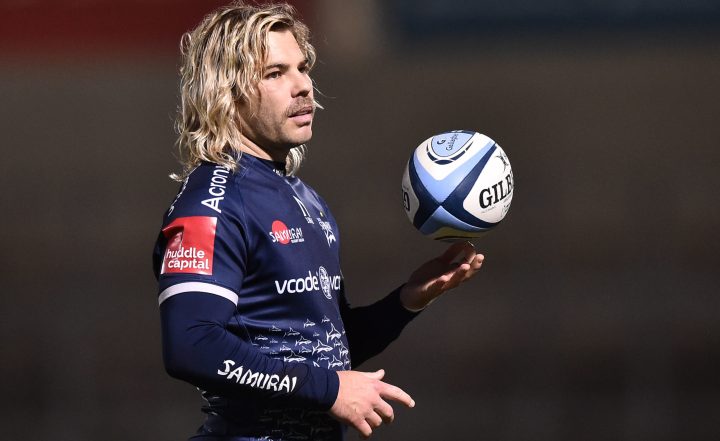
Hundreds of SA rugby players ply their trade abroad. With local franchises depleted of key players, and the quality of the game being affected, it is clear that player retention is an important part of fixing the problem.
The United Rugby Championship (URC) has highlighted several of South African rugby’s weaknesses and shortcomings. As experts lament a shortage of experienced players across the Bulls, Lions, Sharks and Stormers squads, a closer look at the player rosters of premier league clubs in Europe and Japan reveals that nearly 200 of SA’s best players are currently plying their trade overseas.
It would be possible to field three starting XVs comprising players who have represented the Springboks or trained with the national team in recent years.
One could compile 10 starting XVs of players who boast Super Rugby and Currie Cup experience – those who have left SA franchises and now turn out for elite clubs in England’s Premiership, France’s Top 14, Japan’s Top League, and the URC.
It would be possible to compile another XV of South Africans who currently represent countries such as England, Italy, Japan, Scotland and the US at Test level. That representation looks set to rise, with Edinburgh prop Pierre Schoeman (formerly of the Bulls) and Sharks flank Dylan Richardson invited to a Scotland training camp this past week.
Depth depleted by exodus
When you get your head around these numbers, you begin to understand how the franchises have been depleted and why the standard of SA rugby has dropped.
Even more depressing to note is that these numbers don’t take into account those plying their trade in second- and third-divisions overseas, or in the less-prominent club rugby regions of North America and eastern Europe.
It’s hard to say exactly how many South Africans are contracted to clubs around the world. In 2017, the SA Rugby annual listed 332 players at various overseas clubs. When contacted for verification, researchers confirmed that access to data was limited, and that it was more than likely that the number of professional players competing abroad is north of 500.
The world has changed over the past three or four years. The Covid-19 pandemic has exacerbated the financial situation in SA, and has given professional players more reasons to pursue opportunities overseas.
Although the European and Japanese leagues continue to welcome a steady stream of South Africans, there has been a new surge of players heading to less traditional regions such as the US – following the launch of the inaugural Major League Rugby competition in 2018 – and Russia. As a result, the franchises in SA – and even the teams that compete in lower tiers like the Currie Cup First Division – have been severely diluted.
Some might point to the success of the Springboks during this period and declare that the problem has been blown out of proportion. The Bok coach is free to select as many overseas-based players as he wishes. Since 2018, the national side has enjoyed one of its most successful runs in history, winning the 2019 Rugby Championship, the 2019 Rugby World Cup and the recent series against the British & Irish Lions. SA currently sits at the top of the World Rugby rankings. The optics, in that sense, are great.
The severity of the situation in South African rugby, however, has been highlighted during the initial rounds of the URC. Relatively young teams have battled to come to terms with the playing styles, referee interpretations and weather conditions in the northern hemisphere.
Boks: More than 50% based abroad
Some commentators have insisted that the franchises will be a different prospect once the Boks – on duty in the Rugby Championship and subsequently a three-Test tour of Europe – return to their respective clubs in December. This may be true for the Sharks, who will welcome back Siya Kolisi, Lukhanyo Am and several others.
Overall, it’s worth noting that 23 of the 42 Bok squad members who toured Australia recently are contracted to overseas clubs. The likes of Duane Vermeulen, Handré Pollard and others who formed the core of the side that won at the World Cup and beat the Lions are not based in SA.
In short, the overseas clubs, rather than the South African franchises, will receive the biggest boost when the Boks eventually return.
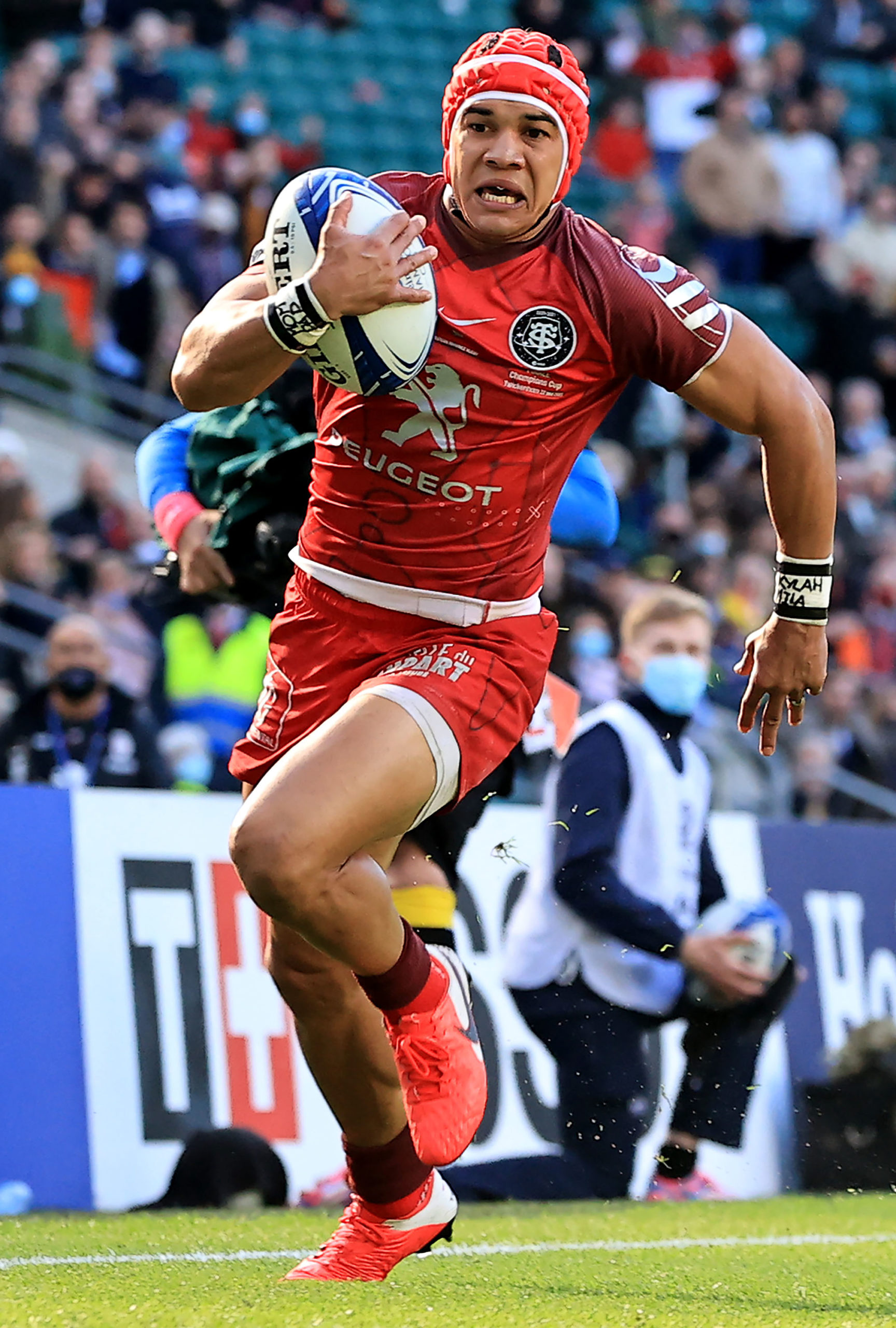
Cheslin Kolbe of Toulouse runs with the ball during the Heineken Champions Cup final match between La Rochelle and Toulouse at Twickenham Stadium on 22 May 2021 in London, England. (Photo: David Rogers / Getty Images)
‘Something that needs to change’
Schalk Brits began his career at Western Province and later went on to play for Saracens in England for nine years. He represented the Boks at two World Cups, and hung up his boots after the team’s success in Japan.
Since then, the former Bok hooker has pursued a career in finance. He is well placed to comment on why players go abroad, as well as the financial situation in SA.
The Bulls, Lions, Sharks and Stormers have taken some time to adapt in the initial rounds of the inaugural URC tournament, but that is only part of the problem. The real issue is that so many of SA’s top players have moved to overseas clubs over the past few seasons.
“It’s certainly something that needs to change if the SA teams are going to be more competitive in the years to come,” Brits told DM168. “Player retention, especially retention of top players, will allow the better teams to improve and build.”
Although SA boasts outstanding junior structures and evidently a top Test side, there is a concern that the franchises don’t retain more of their best players.
This is especially concerning for teams that are hoping to make an impact on the URC in the long term, and to qualify for major tournaments like the Champions Cup and Club World Cup. The latter is yet to be confirmed, but may kick off in 2024.
Will the SA teams stand a chance in these elite tournaments with the current personnel? Perhaps. Can they keep most of their personnel in the years leading up to the Club World Cup? That is arguably the most important question they will face.
Brits points out that as many as nine South Africans are contracted to Sale Sharks. Leicester also boasts a healthy contingent, as do Edinburgh and Glasgow, but South Africans are certainly prevalent in teams across other elite leagues.
“If all of those players were available for an SA team, it follows that they would improve that team,” Brits said. “South African rugby has lost a number of players to overseas clubs – and you can understand why, given the money on offer abroad.”
SA’s mass exodus since 2016
The four SA franchises competing in the inaugural URC are almost completely unrecognisable from the teams that did duty in the 2016 Super Rugby tournament.
The Bulls have retained three out of 40 players who featured in that competition, the Lions two out of 44, the Sharks three out of 38, and the Stormers seven out of 41. The retention rate for all franchises – the four big teams plus the Cheetahs and now defunct Kings – over a period of five years is 7.5%.
It’s important for top players to go overseas and broaden their horizons. The Boks who play abroad will eventually return to the national set-up with new intelligence on foreign players and playing styles.
In the past, the same was true of franchise players who would enjoy sabbaticals in the northern hemisphere and then return to their teams in SA with new skills and information.
Sadly, this is no longer the case, with fewer and fewer players returning from overseas to bolster their local teams. Of the 240 players who represented the six franchises in 2016, 148 (61%) went abroad in subsequent seasons. As many as 130 (54%) are still overseas. Only 18 (7.5%) have returned from abroad to play for a local franchise.
The Lions are the best example of a top team that has been stripped of its top personnel. The Johannesburg-based franchise featured in three consecutive Super Rugby finals between 2016 and 2018. Following a mass exodus over the next few years, only two members of their 2016 squad remain at the union.
The Lions failed to qualify for the Currie Cup playoffs recently. They were lucky to avoid a last-place finish in the South African pool of the URC. The Stormers, who have faced significant challenges off the field, will also battle to compete.
Bulls, Sharks can tackle problems
Brits is optimistic that the Bulls and Sharks will address the issue in the coming seasons. Both teams are now privately owned, and it’s fair to say that the structural changes made over the past two years will benefit these franchises in future.
On the other hand, some feel that SA rugby’s venture into the northern hemisphere will lead to more departures than ever.
Elite clubs won’t need to send scouts down to South Africa to assess promising youngsters or established veterans competing in the Super Rugby tournament or Currie Cup, as they will have the benefit of watching those players compete in the URC or Champions Cup.
One would hope that the franchises find a way to retain their best players – and indeed their best youngsters. It would be a tragedy if Elrigh Louw, Wandisile Simelane and Evan Roos – to name a few – find themselves abroad rather than at a local franchise in three years’ time.
The Bulls, Lions, Sharks and Stormers won’t keep all of their players over the next five years.
They will have to do better than a 7.5% retention rate during that period, however, if they are going to challenge for a major title and realise their potential in Europe. DM168
This story first appeared in our weekly Daily Maverick 168 newspaper which is available for R25 at Pick n Pay, Exclusive Books and airport bookstores. For your nearest stockist, please click here.

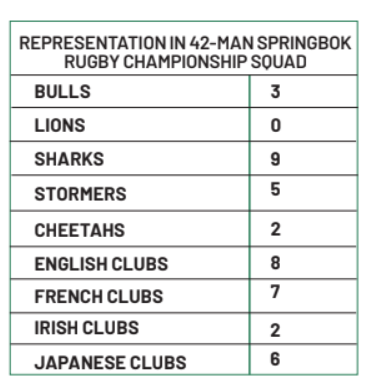
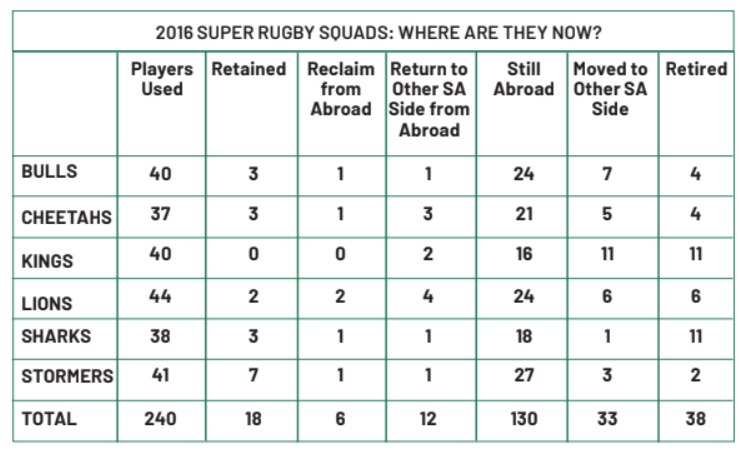
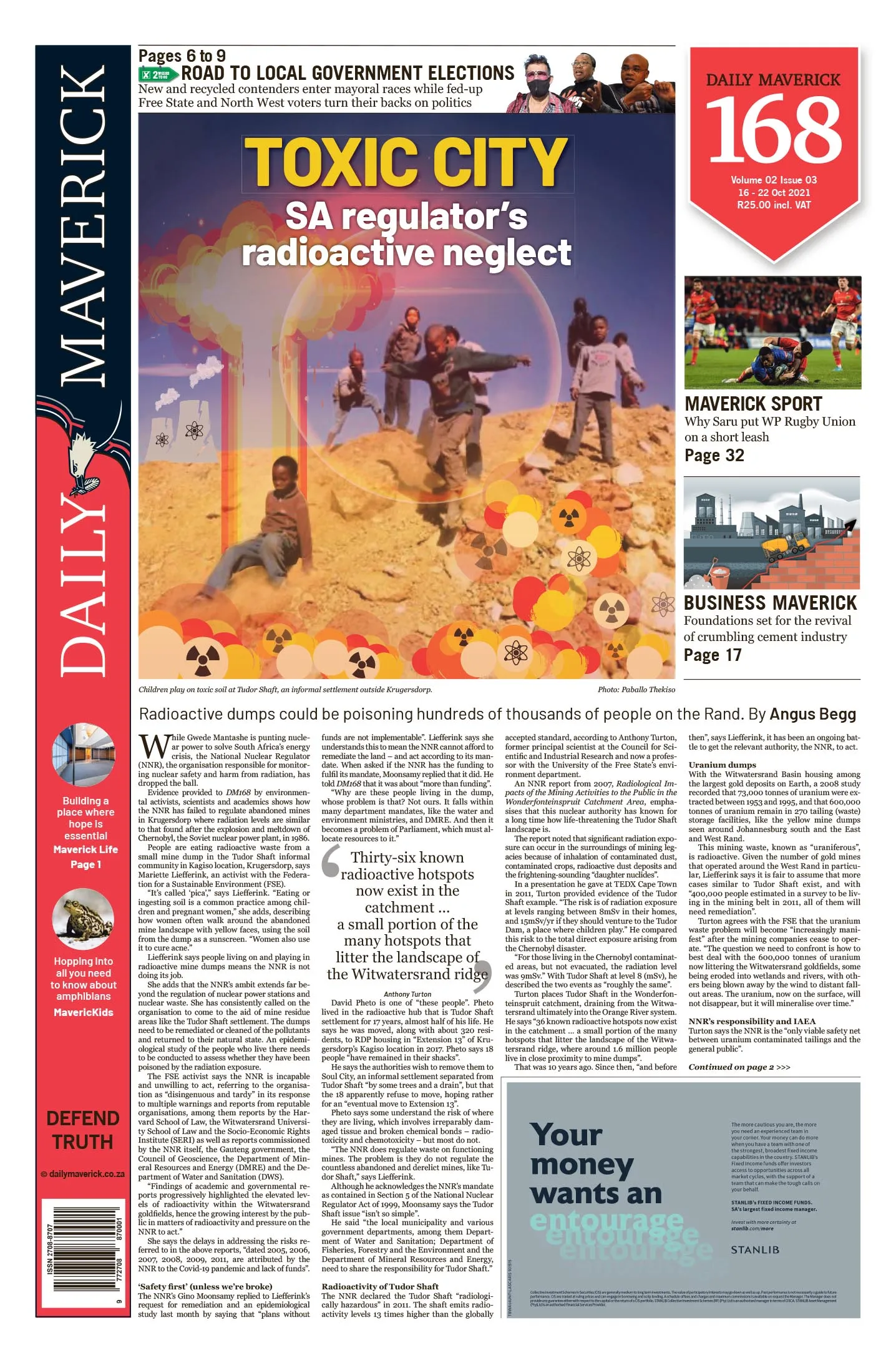















 Become an Insider
Become an Insider
The number of SA sportspeople playing overseas is nothing more than a sad refection of our economy and the value of our currency.
The level of true professionalism in SA does not exist, because of the BEE dictate. No real incentive exists to retain potentially world class performers; with very few exceptions. This includes investors, management acumen and coaches. New Zealand and Australia, from a rugby perspective, have the community based systems which have been professionally developed to retain talent, and attract non citizens. What I find strange is that although we have so many players involved in the European rugby leagues, and although the Union rules are the same, we use the ‘victim’ card for weather, referee interpretations, pitch conditions etc, etc! Do we not share any intelligence and experience previously gained!?